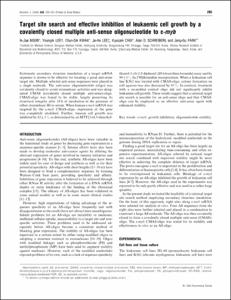Target site search and effective inhibition of leukaemic cell growth by a covalently closed multiple anti-sense oligonucleotide to c-myb
- Keimyung Author(s)
- Kwak, Chun Sik; Park, Jong Gu
- Department
- Dept. of Biochemistry (생화학)
Dept. of Molecular Medicine (분자의학)
Institute for Medical Science (의과학연구소)
- Journal Title
- Biochemical Journal
- Issued Date
- 2000
- Volume
- 346
- Issue
- 2
- Abstract
- Systematic secondary structure simulation of a target mRNA
sequence is shown to be effective for locating a good anti-sense
target site. Multiple selected anti-sense sequences were placed in
a single molecule. The anti-sense oligonucleotide (oligo) was
covalently closed to avoid exonuclease activities and was designated
CMAS (covalently closed multiple anti-sense)-oligo.
CMAS-oligo was found to be stable, largely preserving its
structural integrity after 24 h of incubation in the presence of
either exonuclease III or serum. When human c-myb mRNA was
targeted by the c-myb CMAS-oligo, expression of the gene
was completely abolished. Further, tumour cell growth was
inhibited by 82³3%as determined by an MTT [3-(4,5-dimethyl-thiazol-2-yl)-2,5-diphenyl-2H-tetrazolium bromide] assay and by
90³1%by [$H]thymidine incorporation. When a leukaemic cell
line K562 was treated with CMAS-oligo, colony formation on
soft agarose was also decreased by 93%. In contrast, treatment
with a scrambled control oligo did not signi®cantly inhibit
leukaemic cell growth. These results suggest that a rational target
site search is possible for an anti-sense oligo and that CMASoligo
can be employed as an effective anti-sense agent with
enhanced stability.
Key words: c-myb, growth inhibition, oligonucleotide stability.
- Publisher
- School of Medicine
- Citation
- Ik-Jae MOON et al. (2000). Target site search and effective inhibition of leukaemic cell growth by a
covalently closed multiple anti-sense oligonucleotide to c-myb. Biochemical Journal, 346(2), 295–303. doi: 10.1042/bj3460295
- Type
- Article
- ISSN
- 0264-6021
- 파일 목록
-
-
Download
 oak-aaa-05092.pdf
기타 데이터 / 283.87 kB / Adobe PDF
oak-aaa-05092.pdf
기타 데이터 / 283.87 kB / Adobe PDF
-
Items in Repository are protected by copyright, with all rights reserved, unless otherwise indicated.